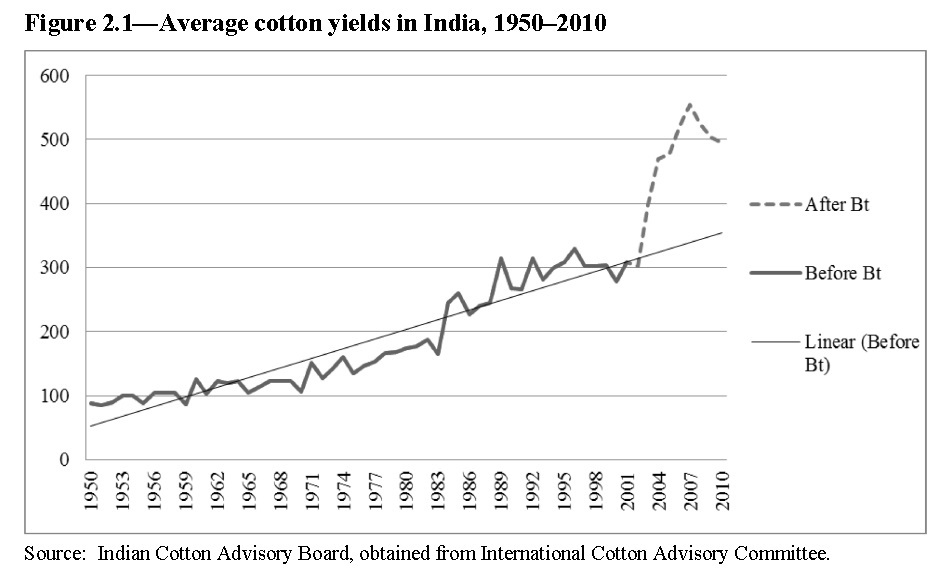What’s Limiting the Impact of GMOs on Global Food Security?
My friend Jon Foley, who I have a great deal of respect for, has a piece up arguing that GMOs have failed to improve global food security because they fall into a trap of reductionist thinking.
With due respect to Jon, I see this a different way.
First, GMOs do bring other global benefits. As Keith Kloor points out at Discover, study after study has shown that GMOs have helped reduce poverty among poor farmers who grow them in the developing world, boosting the food security of those farmers and their families. Those GMOs are primarily cotton, which is, to date, the only GMO that’s allowed to be grown in most of the developing world.
Second, global bans & politicking have stopped promising GMOs from being planted. As I pointed out in my piece on Why GMOs Matter, Especially In the Developing World, over at Grist, there are genetically modified food crops that have shown huge yield gains in parts of the world, and that have been banned from cultivation for no good scientific reason. As I wrote at Grist, Bt Cotton boosted cotton yields by a staggering 60% or so in India, as the figure below shows:

GMO cotton gave yields a huge boost in India. Too bad similarly engineered food crops aren’t allowed.
But we don’t eat cotton. And GM crops we can eat are banned from cultivation:
But the world’s poorest countries, and in particular India and the bulk of sub-Saharan Africa, don’t allow any GM food crops to be grown. India came close to approval for a Bt eggplant (or Bt brinjal). Studies showed that it was safe, that it could cut pesticide use by half, and that it could nearly double yields by reducing losses to insects. But, while India’s regulators approved the planting and sale, activists cried out, prompting the government to place an indefinite moratorium on it. Similar things have happened elsewhere. The same Bt eggplant was supported by regulators in the Philippines who looked at the data, but then blocked by the court on grounds that reflected not specific concerns, but general, metaphorical, and emotional arguments that Nathanael Johnson describes as dominating the debate.
From this, I conclude that one of the reasons that GM crops haven’t done more to boost food security around the world is that non-scientific bans have blocked them from doing so.
Third, we need more public-sector investment in GMO research focused on food security. The fact that Bt crops produce such huge yield gains in the developing world is largely a happy accident. Yield was never the primary goal. GM crops are designed primarily for the customers that have the most to pay (western farmers), and they’ve been designed primarily to save western farmers money rather than to boost yields. It turns out that saving western farmers money by reducing the need to spray insecticide also has an even greater win for countries where insecticide is sprayed by hand (rather than by machine). It, as a practical matter, dramatically reduces losses. That’s an effectively huge yield gain. But again, it’s a bit of a lucky accident of a product targeted at relatively well-to-do western farmers.
I’m a huge advocate of the potential for GM crops to boost yield. (Again, just look at what’s already happened with Bt cotton in India or what early trials showed with Bt brinjal as an example of what the technology can do, without even focusing on yield as the primary goal.) But if we want to see more of this as the outcome, we ought to specifically invest in R&D with that goal.
That R&D might come from the private sector. But it might better come from the public sector. Today the Gates Foundation funds R&D into GMOs that could dramatically boost yield, improve nutrition, and reduce the need for synthetic fertilizer. That’s wonderful. What would be even more wonderful is to see large governments, many of whom worry about the climate-food-water nexus as a future source of instability, investing in R&D in this area as well. Raising food security in the developing world has a triple win of raising food output, lowering poverty, and lowering instability. That’s something we’d all benefit from.
That’s what I’d call holistic thinking.
